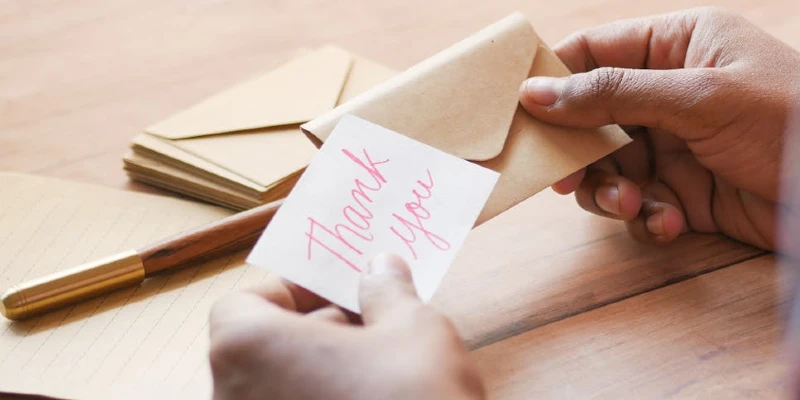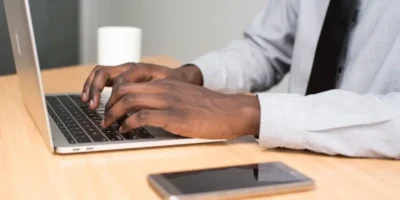This guide outlines how to write thank you cards, with examples for several types of thank you card in common use today.
Thank you cards are small cards (or emails) used to express gratitude. People send or give them to show appreciation for a gift, favour, support, or kind gesture. They can be handwritten or printed, and may include a short personal message. They can be formal or casual, plain or decorative, and are often paired with an envelope.
Thank you cards are still very much used today, though how they’re sent has changed for some people. They’re not considered old-fashioned — rather, they’re often seen as thoughtful, personal, and meaningful in an age of quick digital communication. Below we will outline how to write thank you cards for different occasions, with some examples of messages in each category.
Common uses
- After receiving a gift (e.g. birthday, wedding, baby shower)
- Following a job interview (to thank the interviewer)
- To acknowledge help or kindness (from a friend, teacher, colleague, etc.)
- In business (to thank clients or customers)
How to write thank you cards for a gift
Writing a thank you card after receiving a gift is a thoughtful way to show appreciation. Here’s a simple guide and some example messages to help you craft your note.
Basic Structure of a Thank You Card For a Gift:
- Greeting (“Dear [Name],”)
- Say thank you (“Thank you so much for the…”)
- Mention the gift and why you liked it (“It was so thoughtful – I’ve already used it…”)
- Add a personal touch or future connection (“I hope we can catch up soon…”)
- Sign off (“With love,” “Best wishes,” “Warm regards,” etc.)
Examples of Thank You Cards for a Gift
1. Simple and warm
Dear Sarah,
Thank you so much for the beautiful scarf. It’s such a lovely colour and so soft – I’ve already worn it twice this week! It was a really thoughtful gift. Hope we can catch up soon.
Love, Emma
2. After a birthday
Dear Tom,
Thank you for the amazing book you gave me for my birthday. You always know my taste so well – I’m already halfway through it and loving it! It was great to see you at the party too.
Cheers, Liam
3. After a wedding gift
Dear Aunt Jane,
Thank you for the elegant glassware set – it’s perfect for our new home and we’ll think of you every time we use it. Your kindness and generosity mean a lot to us. Looking forward to sharing a meal together soon.
With love, Alex and Maya
4. After a baby gift
Dear Chloe,
Thank you for the adorable baby clothes – they’re so cute and soft! Baby Lily is going to look gorgeous in them. It was lovely of you to think of us.
Warm wishes, Sophie
5. Casual and short
Hi Ben,
Thanks heaps for the coffee voucher – you know me too well! I’ll enjoy every sip.
Let’s grab a brew soon.
Cheers, Jake
How to write thank you cards after a job interview
Writing a thank you card after a job interview is a smart and professional way to reinforce your interest in the role and leave a positive impression. You can send a handwritten card or, more commonly now, a thank you email — but a physical card can stand out in a thoughtful way, especially for roles in relationship-focused industries (like communications, education, or client service).
How to Structure a Thank You Card After an Interview
- Greeting (“Dear [Interviewer’s Name],”)
- Thank them for their time (“Thank you for taking the time to meet with me…”)
- Mention something specific from the interview (“I enjoyed our discussion about…”)
- Reaffirm your interest in the role (“I’m even more excited about the opportunity…”)
- Close politely (“I look forward to hearing from you soon…”)
- Sign off (“Kind regards,” “Sincerely,” etc.)
Examples of Thank You Cards After a Job Interview
1. Formal and professional
Dear Ms. Chen,
Thank you for taking the time to speak with me on Monday about the marketing coordinator position. I appreciated the opportunity to learn more about your team and the exciting projects at Horizon Media.
Our discussion made me even more enthusiastic about the role, especially the chance to contribute to the upcoming brand campaign. I look forward to hearing from you. Thank you again for your time and consideration.
Sincerely, David Lee
2. Friendly but still professional
Dear Jonathan,
Thank you so much for the great conversation yesterday. I really enjoyed learning more about your vision for the design team and the creative culture at Studio North.
The role sounds like a fantastic fit with my experience, and I’m excited about the chance to contribute to such innovative work. I appreciate your time and hope to speak again soon.
Best regards, Mia Tran
3. Short and to the point (suitable for a handwritten card)
Dear Dr. Patel,
Thank you for the opportunity to interview for the research assistant role. I enjoyed our conversation and learning more about your work on early childhood development. I’m very interested in the role and hope to contribute to the team.
Kind regards, Samira Khan
How to write thank you cards acknowledging a favour or support
Writing a thank you card to someone who has done you a favour or shown support is a heartfelt way to acknowledge their kindness and let them know it made a difference. These kinds of cards are often informal and personal — the key is sincerity.
Structure of a Thank You Card for a Favour or Support
- Greeting (“Dear [Name],”)
- Thank them directly (“Thank you so much for helping me…”)
- Mention the specific favour or support (“…with the school application,” “…when I was going through a rough time,” etc.)
- Express what it meant to you (“I genuinely don’t know what I would’ve done without you…”)
- Close with warmth (“I’m so lucky to have you in my life.” / “Looking forward to catching up soon.”)
- Sign off (“With thanks,” “Warmly,” “Love,” etc.)
Examples of Thank You Cards to Acknowledge a Favour or Support
1. For emotional support
Dear Lucy,
Thank you so much for being there for me these past few weeks. Your kind words, thoughtful messages, and just being someone I could talk to made a huge difference. I’m truly grateful for your friendship – I don’t take it for granted.
With love, Jess
2. For practical help (e.g., moving house)
Dear Mark,
Thank you for helping me move house last weekend. I know it was a big job, and I couldn’t have done it without your muscle and good humour! Next time coffee (or beer!) is on me.
Cheers, Nate
3. For a professional favour
Dear Priya,
I really appreciate you putting in a good word for me with your manager. It means a lot to have your support and confidence in my work. Thanks again for going out of your way to help.
Best regards, Thomas
4. For support during illness or grief
Dear Amanda,
Thank you for your kindness and support after Mum passed. Your messages, the meal you dropped off, and just knowing you were there really helped me through those first difficult days. I’m grateful beyond words.
Love, Claire
5. Short and sweet
Hi Alex,
Just a quick note to say thanks for helping me with my laptop issues last week. You saved me from a major panic! I owe you one.
Thanks again, Mia
Thank you card vs thank you email
Choosing between a thank you card and a thank you email depends on the situation, your relationship with the person, and how quickly you want your message to reach them. Below we categorise when and how to write thank you cards vs emails in different situations.
When to Send a Thank You Card (handwritten or printed)
- Formal occasions (weddings, graduations, baby showers)
- Personal gestures of support (after illness, grief, help during a crisis)
- Meaningful favours or generosity (a big favour, long-term help, or mentorship)
- When you want to stand out (in creative industries or competitive job roles)
- To show extra thought or care (a handwritten card feels more personal)
When to Send a Thank You Email
- Work or professional settings (e.g. after a job interview, client meeting)
- When time matters (you want to follow up quickly)
- Less formal situations (a friend helped with something minor)
- To people you mainly communicate with online




